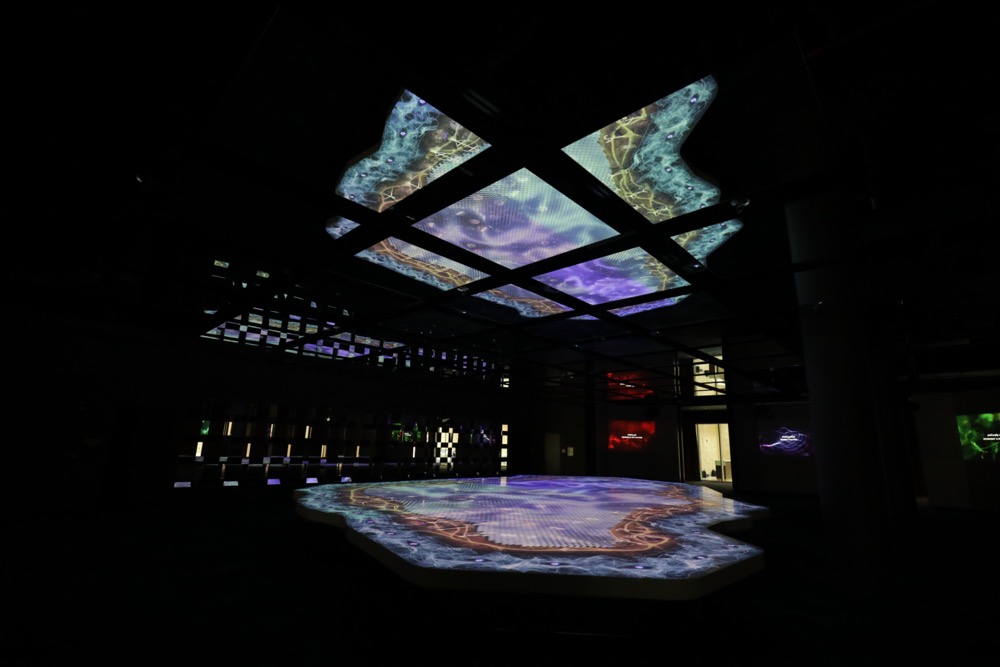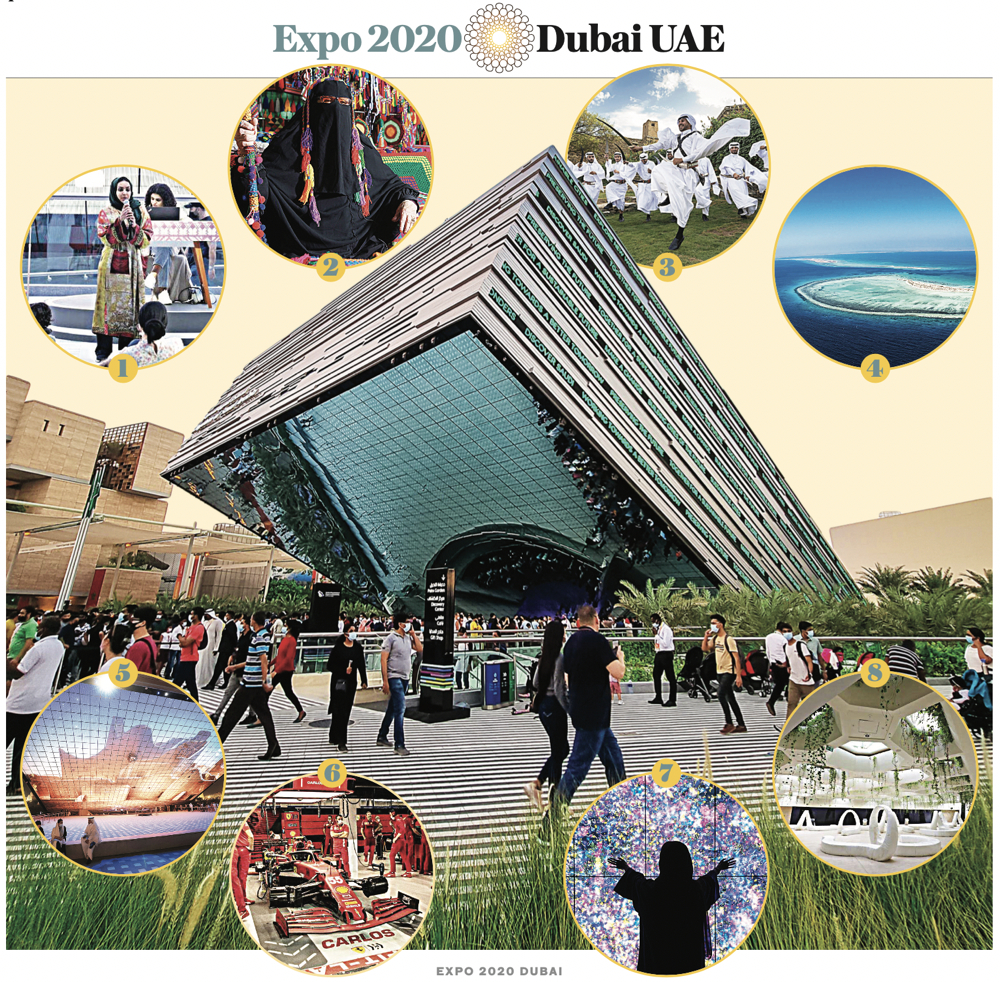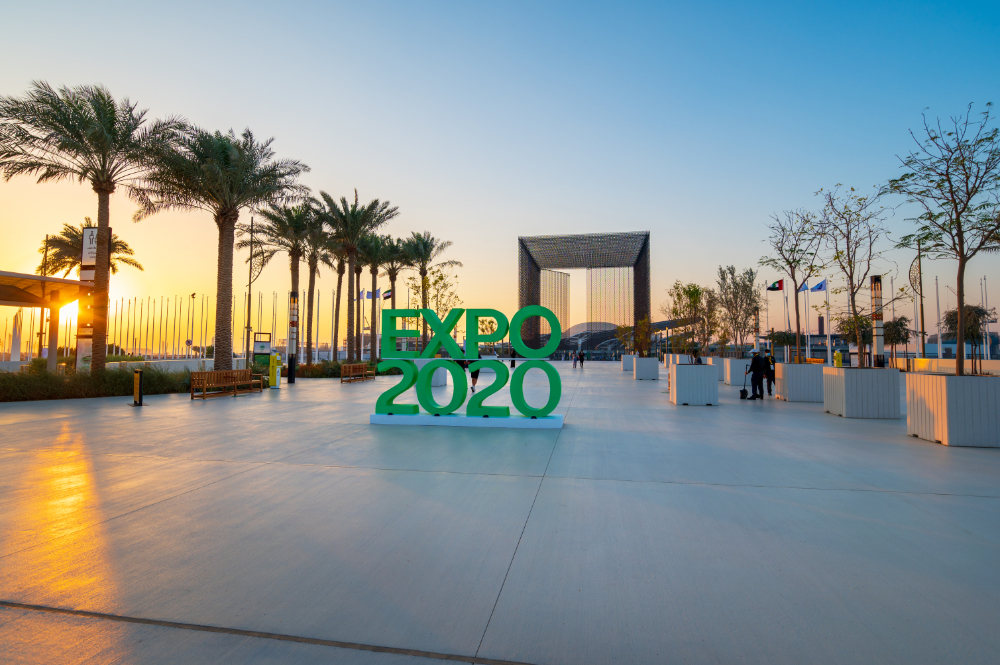DUBAI: For the past six months, Saudi Arabia’s people and natural landscapes, as well as its past, present and future, were celebrated by an award-winning pavilion at the world’s most famous exhibition.
Since its launch on Oct. 1 last year, some 4.6 million visitors had a chance to visit the pavilion, experience Saudi hospitality and engage with Saudis to hear unique and exciting stories about the Kingdom.
Rising six stories above the ground and featuring a 1,320 sq. m inclined mirrored screen, the Saudi Pavilion at Expo Dubai 2020 was designed to showcase the Kingdom’s culture, heritage, natural wonders, as well as its present and future ambitions.
The rectangular facade of the sloping structure soared to the sky, as if ready to take flight. The pavilion spanned an impressive 13,069 sq. m — the size of two football pitches — and was the second largest in size.
The building, designed by Spain-based Boris Micka Associates, was an architectural landmark, embodying Saudi Arabia’s bold ambition to shape the world for the better.

Saudi Pavilion won an award within the best pavilion category. (Supplied)
“The pavilion is our country’s ‘window to the world,’ showcasing Saudi Arabia as it really is,” Hussain Hanbazazah, the commissioner-general of the Saudi Pavilion, told Arab News shortly after the inauguration in the last week of September.
“The structure opens like a large window into the future, with immersive experiences showing the nation’s welcoming character, rich history and heritage, and ancient culture.
“It also showcases the towering ambition of the Saudi people and unlimited drive of our nation as well as the myriad opportunities under our national transformation plan, Vision 2030.”
Visitors descended via a staircase, onto an outside terrace area, that included an award-winning circular water feature.
From there, guests could go inside to marvel at startling images of Saudi Arabia’s diverse natural landscape on vast screens.
It was the first stop on a technology-enabled journey through five ecosystems presented on different levels of the pavilion, guiding the visitor through the Kingdom’s natural wonders — its unspoiled coastline, vast deserts, mountainous terrains and biodiversity.

Saudi Pavilion
1—16 Windows Highlighting the beauty of Saudi culture, the pavilion introduced visitors to a different sector of the cultural economy each week, from film and literature to heritage and fashion.
2—Saudi crafts Children learned about Saudi Arabia’s unique regional handicraft traditions by making floral head wreaths and taking part in Al-Sadu weaving workshops.
3—Saudi folklore Daily performances in the pavilion’s open square introduced visitors to the Kingdom’s rich folklore traditions, ranging from the Saudi Ardah, Al-Liwa, Al-Azawi, and Al-Khubaiti.
4—Business forums Saudi entrepreneurs met with their global counterparts to discuss opportunities for cooperation in investment, sustainability, healthcare, digitization, innovation and smart cities.
5—Saudi sounds In the pavilion’s Palm Garden, visitors enjoyed live music performances from Saudi musicians.
6—Sports programs Reflecting the Kingdom’s growing prominence in global sport, the pavilion offered visitors exciting VR experiences, live coverage of motor racing and more.
7—Saudi Salon Monthly discussion sessions in an open format focused on topics of cultural and social significance in the Kingdom and beyond.
8—Sustainable energy A program of science activities allowed children to learn about recycling and sustainability by transforming recycled materials into eye-catching works of art.
As guests made their way to the top floor of the building, they were transported up an escalator where around them were built and projected scenes of the flora of Rijal Almaa and its traditional flower festival in the Asir Region.
In their virtual journey, they then passed the Sarawat Mountains, known for its towering peaks and expansive valleys, and then to the endless sand dunes of the Empty Quarter in southeastern Saudi Arabia and finally into the clear waters of the Red Sea.
“The Saudi Pavilion’s design and architecture is as fascinating and dynamic as the content it displays; it encapsulates the wonders of the Kingdom. Saudi Arabia has developed an outstanding architectural landmark, embodying a bold ambition to shape the world for the better,” Hanbazazah told Arab News.
“The design reflects both the country’s past and aspiring future, inviting guests to explore our beautiful natural landscapes while learning about the rich history that has shaped the Saudi Arabia we celebrate today.”
The highest floor revealed additional large floor-to-ceiling screens in addition to one on a long circular-like table.
Playing across both were a series of short films immersing visitors into Saudi Arabia’s 14 cultural landscapes, including UNESCO World Heritage Sites such as At-Turaif District in Ad-Diriyah, Hegra Archaeological Site in AlUla, Historic Jeddah, Rock Art in the Hail Region, and Al-Ahsa Oasis.
It was a breathtaking and eloquent invitation to visit the Kingdom’s dazzling cultural sites — many of which have only recently been opened to international visitors.
Nearby was an audiovisual guide that prompted visitors to explore 23 additional destinations in the Kingdom, including its giga-projects showcasing the country’s heritage and ambitions for sustainable development, Qiddiya, Diriyah Gate and King Salman Park.
This month, the Saudi Pavilion won an award within the best pavilion category, along with two honorary awards, following selection by the Exhibitor magazine, which hands out awards during each edition of Expo.

Saudi Arabia lowered the curtain on its Expo 2020 Dubai pavilion on Monday, and looked to raise an- other one — by hosting Expo 2030 in Riyadh. (Shutterstock)
The pavilion won the award for the best pavilion in the category of large suites, as well as the honorary award in the category of best exterior design and best display.
Earlier, it was awarded the LEED Platinum Certificate by the US Green Building Council, designating it among the most sustainable designs in the world.
It also holds three Guinness World Records for the longest interactive state-of-the-art water feature, the largest LED mirror screen display and the largest interactive lighting floor.
“Through rich and varied content, the Saudi Pavilion seeks to offer visitors a unique experience that reflects the true image of the Kingdom as it is today under Saudi Vision 2030, our road map for the future, while emphasizing the importance of pride in identity, history and heritage,” said Hanbazazah.
FASTFACTS
• 2nd largest pavilion with a total area of 13,059 sq. m.
• LEED Platinum certified innovative, sustainable design.
• Four main pillars: People, nature, heritage & opportunities.
“The journey through the Saudi Pavilion showcases a future-focused Saudi Arabia: Welcoming, young, diverse and vibrant.”
The appeal of the Saudi Pavilion extended far beyond the sheer structure of the building because it also took visitors on a journey through the Kingdom itself.
Once visitors completed the heritage and natural tour of the pavilion, they could view “Vision,” an interactive art exhibition revealing a 30-meter sphere that appeared to float in the room above a custom-built interactive floor that transformed into various patterns, colors and light displays.
Lastly, located just outside the main edifice was the Discovery Center, an explanatory section where guests could view the history and build of the pavilion as well as connect leaders from around the world to forge potential partnerships and discuss investment opportunities, visualized through an interactive digital map of Saudi Arabia.
The journey ended with a gift shop and the pavilion’s very own cafe, Sard, where customers were met with a tantalizing display of coffees from across the Kingdom, their aromas filling the air.




























